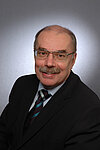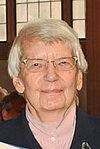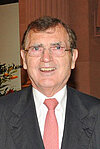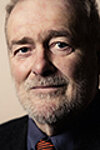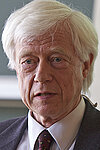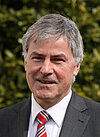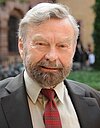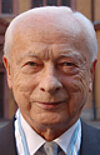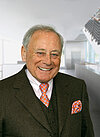Röntgen Medal
Röntgen-Medal of the University of Würzburg
The Röntgen Medal is an award conferred by the University of Würzburg on eminent scientists and patrons of the University. Awarded for the first time in the summer of 2009 on the occasion of the Stiftungsfest, the Röntgen Medal was initially designed as an award for patrons of the University. It has also been awarded to scientists since 2012.
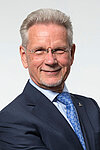
Manfred Wittenstein (2024)
Dr.-Ing. E.h. Manfred Wittenstein made the WITTENSTEIN SE Group, headquartered in Igersheim (Main-Tauber district), one of the most important drivers of innovation in the field of mechatronic and cybertronic drive technology. It has long been one of JMU's most generous sponsors. His patronage reached a peak in 2023 with the DynaMINT research project made possible by the Wittenstein Foundation. The foundation is funding the project, which is coordinated by the university's MIND Center, with around one million euros. It accompanies children and young people over several years in order to analyze their educational and career decisions and to research how extracurricular educational opportunities can influence the image of STEM professions among pupils.

Georg Nagel (2024)
Georg Nagel joined JMU in 2004 and held a professorship in Molecular Plant Physiology until 2021. He has been a senior professor at the Institute of Physiology since 2021. He researches membrane transport and its molecular players in plants and humans; he also investigates artificially produced light receptors and their optogenetic application. Based on his work, for which he has received prestigious awards, applications are being developed that aim to restore lost vision and treat Parkinson's disease, among other things.
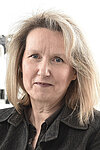
Anna-Leena Sirén (2024)
Anna-Leena Sirén was University Professor of Experimental Neurosurgery at JMU from 2004 to 2021; since 2021 she has been Senior Professor at the Institute of Physiology. Her research focuses on the mechanisms of nerve regeneration after brain injury. Together with a team from the Max Planck Institute for Experimental Medicine, she succeeded in developing the world's first successful neuroprotective treatment for stroke patients. She has received numerous awards for her pioneering work.
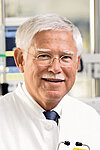
Prof. Dr. Christian P. Speer (2023)
After studying human medicine in Göttingen, Christian P. Speer earned his doctorate and began his residency at the University Children's Hospital in Göttingen in 1977. In 1986 he was appointed clinical senior physician there and habilitated in the same year. Initially appointed as a temporary university professor of pediatrics, he held a tenured professorship from 1994 and was appointed medical director of the Department of Neonatology at the University Children's Hospital in Tübingen. On May 1, 1999, he accepted a call to Würzburg and held the chair of pediatrics until 2020. He continues to work at the Medical Faculty to this day. Through his comprehensive expertise in the field of pediatrics, he further developed the various departments of the Children's Hospital and implemented groundbreaking structural changes. His fundamental work in the field of neonatal medicine led to a massive improvement in the survival chances of premature infants within the last decades. As an outstanding scientist, Speer is an active and sought-after member of several committees and professional societies worldwide. Thanks to his profound expertise, he has also had a significant impact on the development of the University Hospital of Würzburg as a member of the supervisory board and on the medical faculty as an outstanding university lecturer.
Prof. Dr. Helmuth Schulze-Fielitz (2022)
In 1994, he declined a call to the University of Marburg and followed the call to the Chair of Public Law, Environmental Law and Administrative Sciences at the Julius Maximilian University of Würzburg, which he held until 2012. As Vice-Dean, Dean and Dean of Studies, Helmuth Schulze-Fielitz played a decisive role in shaping the development of the Faculty of Law. His involvement in the Association of German Teachers of Constitutional Law, of which he was chairman in 2008 and 2009, helped the faculty to achieve nationwide representation. Beyond his contribution to the profile of his subject, Helmuth Schulze-Fielitz was and is particularly committed to the university as a whole. He is one of the founding members of the Würzburg Scientific Society, is a founding member and Chairman of the Board of Trustees of the "Stiftung Umweltenergierecht" (Foundation for Environmental Energy Law) and served for a long time as the first Chairman of the Standing Commission for the Investigation of Scientific Misconduct. Not only as a scientist and networker, but also as a generous benefactor, Helmuth Schulze-Fielitz has rendered great service to JMU.
Prof. Dr. Horst Dreier (2021)
After several years in professorships in Heidelberg and Hamburg, he followed the call to Würzburg and worked there as a full professor for legal philosophy, constitutional and administrative law and dean of the law faculty. He was very active in publishing highly acclaimed writings and series on topics of jurisprudence, was active at the Wissenschaftskolleg in Berlin, at the "Max Weber-Kolleg für kultur- und sozialwissenschaftliche Studien" in Erfurt and at the "Carl Friedrich von Siemens Stiftung" in Munich. As a trusted lecturer of the "Studienstiftung des Deutschen Volkes" (German National Academic Foundation), expert reviewer for "Philosophy of Law and State" of the "Deutsche Forschungsgemeinschaft" (DFG) and member of the scientific board of trustees of the "Forschungsstätte der Evangelischen Studiengemeinschaft e. V." (Research Center of the Protestant Study Community), he made a name for himself in the academic world and was a member of the National Ethics Council of the Federal Republic of Germany. In addition, he shaped his subject and its public voice through several other positions and offices and was nominated as a judge at the Federal Constitutional Court. Horst Dreier's scholarly work demonstrates a nationally and internationally outstanding knowledge of the constitutional history and history of ideas in public law, which is why he is the recipient of numerous awards.
Jörg Hacker (2019)
As a pioneer in molecular infection research, Jörg Hacker's scientific work is inextricably linked to the concept of islands of pathogenicity of microorganisms developed together with Werner Goebel. Originally discovered in Escherichia coli, it soon became apparent that islands of pathogenicity are widespread in bacteria. Jörg Hacker's scientific work was not only to shape molecular pathogenicity research in Germany, it also brought him high international recognition. In 2000 and 2005, research stays took him to the Institut Pasteur in Paris. In 2006, he was a visiting professor at Tel Aviv University in Israel.
He has received honorary doctorates from the universities of Umeå in Sweden, Pecs in Hungary, Hyderabad and Delhi in India, Tel Aviv in Israel, and the Russian Academy of Sciences. In addition, he has received numerous awards and prizes, including the Cross of Merit on Ribbon of the Federal Republic of Germany in 2009 and the Bavarian Order of Maximilian for Science and Art in 2012.
His key characteristic is his ability to promote conversation between people from different disciplines. His respectful manner as well as his broad interest in culture, literature, history and politics help him to inspire his counterpart for scientific, but also politically relevant topics.
Herbert Wellhöfer (2017)
In 1975, Herbert Wellhöfer began to work for the company Wellhöfer Treppen GmbH & Co. KG Würzburg, which was founded by his father Erich Wellhöfer. Over a long period of time he controlled the fate of the ever-expanding business, which has been considered as a leading German provider of folding attic stairs, space-saving stairs, and so-called “Kniestocktüren”.
As a friend and sponsor, Wellhöfer kept contact with his hometown Würzburg. In 2016, he donated a collection of about 400 ancient coins that he had collected over many years to the Martin von Wagner Museum.
Geographically, the collection covers an area from Bactria (North Afghanistan) to the East Coast of the Iberian Peninsula. Temporally, it covers the beginnings of coining in the 6th century B.C. to late Hellenism.
In addition to the significant donation, he supported the collection of antiquities with a generous donation for the museum and scientific research as well as an adequate presentation of the collection.
With another monetary donation, Wellhöfer financed new lighting for the museum's painting gallery, laying the foundation for a comprehensive renovation that was completed with the opening of the major Julius Echter exhibition in June 2017.
Traute Schröder-Kurth (2017)
After MTA-training at the Lette-Haus in Berlin, Traute Schröder Kurth studied medicine im Hamburg. After completing her state examination, she changed location from Hamburg to Heidelberg, where she did her doctorate and qualified as a professor for Human Genetics in 1971. In Heidelberg, she established one of the first diagnostic cytogenetics laboratories in Germany and was appointed as a professor in 1975. She was the first scientist worldwide to perform chromosome analysis on patients suffering from Faconi anaemia.
As a founding member of the European Fanconi anemia research organization, she was essential in the creation of a Fanconi anemia registry and dedicated her entire life to successfully researching various aspects of Fanconi anemia.
Another focus of her research is the critical monitoring of the increase in medical ethics problems caused by advances in genetics, which she addresses in various ethics committees. She does so in different ethics commissions.
In 1995, she changed to the Würzburg Institute of Human Genetics at the Biozentrum as a visiting professor and ran the third-party funded project “Ethische Fragen in der Humangenetik”. In 1997, she initiated the "Schroeder-Kurt-Fonds" to create a solid financial base for the Fanconi anaemia research in Würzburg together with her husband Hans-Joachim Kurth. In 2007, she increased this fund substantially to allow for continued research.
Gabriele Nelkenstock (2017)
The social pedagogue and former businesswoman in the fashion industry is chairwoman of the society for “Hilfe im Kampf gegen Krebs e.V.” which she had initiated. The society has been funding, supporting and making projects of the university medical center become reality throughout more than 25 years.
With dedication and creativity, Ms. Nelkenstock frequently launches new campaigns with which she arouses the enthusiasm of the public and the interest of sponsors. With benefit concerts, relay marathons, handball tournaments, appeals for donations, charity days and many other projects, she supports the efforts in the fight against cancer and thus makes life easier for patients and their loved ones.
She supports not only the fight against acute diseases, but also cancer research itself, e.g. with the construction of one of the most modern stem cell therapy centers in Germany at the UKW, as part of the „Aktion Stammzelltherapie“ (Stem Cell Therapy Campaign).
The association also supports the application of modern therapies within the framework of clinical research, as well as the promotion of young scientists with doctoral scholarships.
One of the particularly ambitious projects was the crowdfunding campaign "Dein Immunsystem wird deine Waffe gegen Krebs“ (2016) (Your immune system becomes your weapon against cancer", with donations totaling over one million euros.
Baldwin Knauf (2017)
As Chairman of the Shareholders' Committee of the Knauf Group of Companies, he has been associated with Alma Julia for many years. Being a member of the university council since 2013, he supports the University Directorate with his extraordinary commitment and expertise.
He sponsors various activities at the Alma Mater with generous donations, including a number of projects and events like the “No Limits!” sports festival for people with and without disabilities.
Furthermore, Baldwin Knauf supports outstanding students by a scholarship called “Deutschlandstipendium” (since 2011) and is involved in the promotion of the young as a partner and sponsor of the job fair “study & stay”.
Several forward-looking projects in the infection and cancer research are actively promoted by him. Moreover, he organizes an annual symposium called "Faszination Forschung" for the JMU.
Prof. Dr. Dieter Kuhn (2016)
By accepting the professorial chair of Far Eastern Philology at the University of Würzburg in 1988, Kuhn initialized the systematic modernization of the sinological range of courses. The study programme “Modern China” (from 2002) underlines the leading role Würzburg in the field of sinology. Thanks to the successful cooperation with the Faculty of Economics, the Institute has been adapted to modern requirements. The intensive contact and exchange of research and science with Chinese universities is also credited to Kuhn’s dedication. With his relentless commitment Kuhn helped the Würzburg Field of Sinology achieve worldwide recognition, until he was given emeritus status in 2011.
Prof. Dr. Heisenberg (2015)
In 1975, at the age of only 35, Prof. Dr. Heisenberg took over the chair of genetics and neurobiology at the Julius Maximilian University of Würzburg, which he held for almost 35 years until his retirement. He held this position for almost 35 years until he retired at the end of 2008. Since 2010, Prof. Dr. Heisenberg has held a senior professorship at the Rudolf Virchow Centre for Experimental Biomedicine. He is one of the leading scientists worldwide in the field of neurobiology and genetics and the pioneer of neurogenetics in Germany.
Prof. Dr. Helmut Pfotenhauer (2014)
Holder of the Chair of History of Modern German Literature I at the University of Würzburg from 1987 to 2011. His research focuses, among other fields, on the literature, poetics and aesthetics of the 18th, 19th and 20th centuries, literary anthropology and intermediality. In his capacity as President of the Jean Paul Society and editor of the Society's yearbook, he founded the University of Würzburg's Centre Jean Paul Edition in 2004.
Since 1988 he has been Professor of Oriental Philology (since 2003 renamed "Ancient Oriental Studies") at the University of Würzburg. Gernot Wilhelm has been editor for Hittitology at the Reallexikon für Assyriologie (Encyclopedia of Ancient Near Eastern Studies) since 1988, and was a member of the editorial board of the Zeitschrift für Assyriologie (Journal of Ancient Near Eastern Studies) from 1994 to 2005. In 2001, he became Chairman of the Committee for the Ancient Near East at the Akademie der Wissenschaften und der Literatur (Academy of Sciences and Literature), Mainz, and Director of the Academy's project "Hittite Studies" that analyses the excavations at Hattusa.
Prof. Dr. Bert Hölldobler (2012)
An expert on the sociobiology of insects, he has produced groundbreaking work, particularly on the social behavior and ethoecology of ants. In 1969, he went to the US to accept a professorship at Harvard University. Together with Edward O. Wilson, his colleague at Harvard, Hölldobler authored "The Ants" for which they received the Pulitzer Prize in 1991. In 1989, Hölldobler returned to the University of Würzburg where he held the Chair of Zoology II until 2004.
Dipl.-Ing. Dr. Herbert Brause (2010)
Since 1976, Herbert Brause has been committed to the teaching of technical content and the establishment of a media library for research and teaching in teacher education. In 1986, he established a foundation that helped finance, among other projects, the construction of the Language and Media Education Centres (ZfS and ZfM) on Hubland Campus as well as the purchase of state-of-the-art video equipment for the University Clinic.
Prof. Dr. Dieter Salch (2010)
From 1995 to 2001, Dieter Salch held a lectureship at the University of Würzburg. In the context of the Universitätsbund, he established his own foundation, the Dieter Salch Stiftung Pro Universitate, in 1991 with the goal of promoting research and teaching, especially at the Faculty of Law. Dieter Salch was a co-founder of Juristen Alumni e. V. (established in 1991), an organisation of alumni of the Faculty of Law that served as a model for setting up an organisation of alumni of all faculties of the University.
Prof. Dr. Reinhold Würth (2009)
A patron and sponsor of the University's Adolf-Würth-Centre, Reinhold Würth was the first Röntgen Medal awardee. This medal is awarded to patrons of science. Reinhold Würth is an entrepreneur from the German state of Baden-Württemberg and Chairman of the Supervisory Board of the foundation of Würth Group.




![[Translate to Englisch:] Nobelpreis Röntgen Ausschnitt](/fileadmin/_processed_/8/4/csm_Nobelpreis_Ausschnitt_cbf91ddcc5.jpg)
